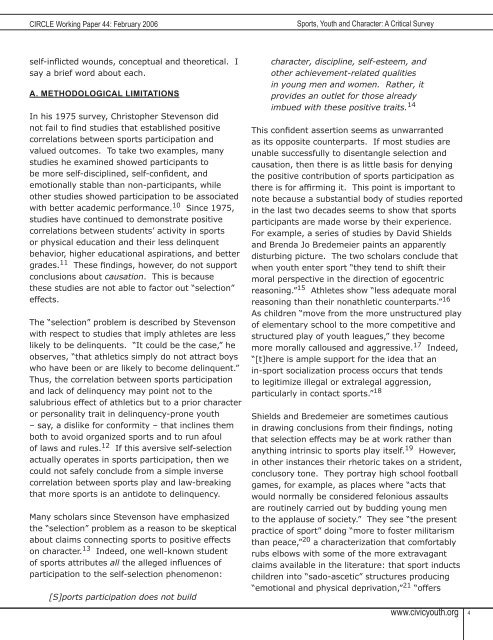The All-Sports Ministry of PA NJ & DE - Executive Summary Start-Up Budget & Prospectus
The All-Sports Ministry of PA NJ & DE - Executive Summary Start-Up Budget & Prospectus
The All-Sports Ministry of PA NJ & DE - Executive Summary Start-Up Budget & Prospectus
You also want an ePaper? Increase the reach of your titles
YUMPU automatically turns print PDFs into web optimized ePapers that Google loves.
CIRCLE Working Paper 44: February 2006<br />
<strong>Sports</strong>, Youth and Character: A Critical Survey<br />
self-inflicted wounds, conceptual and theoretical. I<br />
say a brief word about each.<br />
A. METHODOLOGICAL LIMITATIONS<br />
In his 1975 survey, Christopher Stevenson did<br />
not fail to find studies that established positive<br />
correlations between sports participation and<br />
valued outcomes. To take two examples, many<br />
studies he examined showed participants to<br />
be more self-disciplined, self-confident, and<br />
emotionally stable than non-participants, while<br />
other studies showed participation to be associated<br />
with better academic performance. 10 Since 1975,<br />
studies have continued to demonstrate positive<br />
correlations between students’ activity in sports<br />
or physical education and their less delinquent<br />
behavior, higher educational aspirations, and better<br />
grades. 11 <strong>The</strong>se findings, however, do not support<br />
conclusions about causation. This is because<br />
these studies are not able to factor out “selection”<br />
effects.<br />
<strong>The</strong> “selection” problem is described by Stevenson<br />
with respect to studies that imply athletes are less<br />
likely to be delinquents. “It could be the case,” he<br />
observes, “that athletics simply do not attract boys<br />
who have been or are likely to become delinquent.”<br />
Thus, the correlation between sports participation<br />
and lack <strong>of</strong> delinquency may point not to the<br />
salubrious effect <strong>of</strong> athletics but to a prior character<br />
or personality trait in delinquency-prone youth<br />
– say, a dislike for conformity – that inclines them<br />
both to avoid organized sports and to run afoul<br />
<strong>of</strong> laws and rules. 12 If this aversive self-selection<br />
actually operates in sports participation, then we<br />
could not safely conclude from a simple inverse<br />
correlation between sports play and law-breaking<br />
that more sports is an antidote to delinquency.<br />
Many scholars since Stevenson have emphasized<br />
the “selection” problem as a reason to be skeptical<br />
about claims connecting sports to positive effects<br />
on character. 13 Indeed, one well-known student<br />
<strong>of</strong> sports attributes all the alleged influences <strong>of</strong><br />
participation to the self-selection phenomenon:<br />
[S]ports participation does not build<br />
character, discipline, self-esteem, and<br />
other achievement-related qualities<br />
in young men and women. Rather, it<br />
provides an outlet for those already<br />
imbued with these positive traits. 14<br />
This confident assertion seems as unwarranted<br />
as its opposite counterparts. If most studies are<br />
unable successfully to disentangle selection and<br />
causation, then there is as little basis for denying<br />
the positive contribution <strong>of</strong> sports participation as<br />
there is for affirming it. This point is important to<br />
note because a substantial body <strong>of</strong> studies reported<br />
in the last two decades seems to show that sports<br />
participants are made worse by their experience.<br />
For example, a series <strong>of</strong> studies by David Shields<br />
and Brenda Jo Bredemeier paints an apparently<br />
disturbing picture. <strong>The</strong> two scholars conclude that<br />
when youth enter sport “they tend to shift their<br />
moral perspective in the direction <strong>of</strong> egocentric<br />
reasoning.” 15 Athletes show “less adequate moral<br />
reasoning than their nonathletic counterparts.” 16<br />
As children “move from the more unstructured play<br />
<strong>of</strong> elementary school to the more competitive and<br />
structured play <strong>of</strong> youth leagues,” they become<br />
more morally calloused and aggressive. 17 Indeed,<br />
“[t]here is ample support for the idea that an<br />
in-sport socialization process occurs that tends<br />
to legitimize illegal or extralegal aggression,<br />
particularly in contact sports.” 18<br />
Shields and Bredemeier are sometimes cautious<br />
in drawing conclusions from their findings, noting<br />
that selection effects may be at work rather than<br />
anything intrinsic to sports play itself. 19 However,<br />
in other instances their rhetoric takes on a strident,<br />
conclusory tone. <strong>The</strong>y portray high school football<br />
games, for example, as places where “acts that<br />
would normally be considered felonious assaults<br />
are routinely carried out by budding young men<br />
to the applause <strong>of</strong> society.” <strong>The</strong>y see “the present<br />
practice <strong>of</strong> sport” doing “more to foster militarism<br />
than peace,” 20 a characterization that comfortably<br />
rubs elbows with some <strong>of</strong> the more extravagant<br />
claims available in the literature: that sport inducts<br />
children into “sado-ascetic” structures producing<br />
“emotional and physical deprivation,” 21 “<strong>of</strong>fers<br />
www.civicyouth.org 4

















